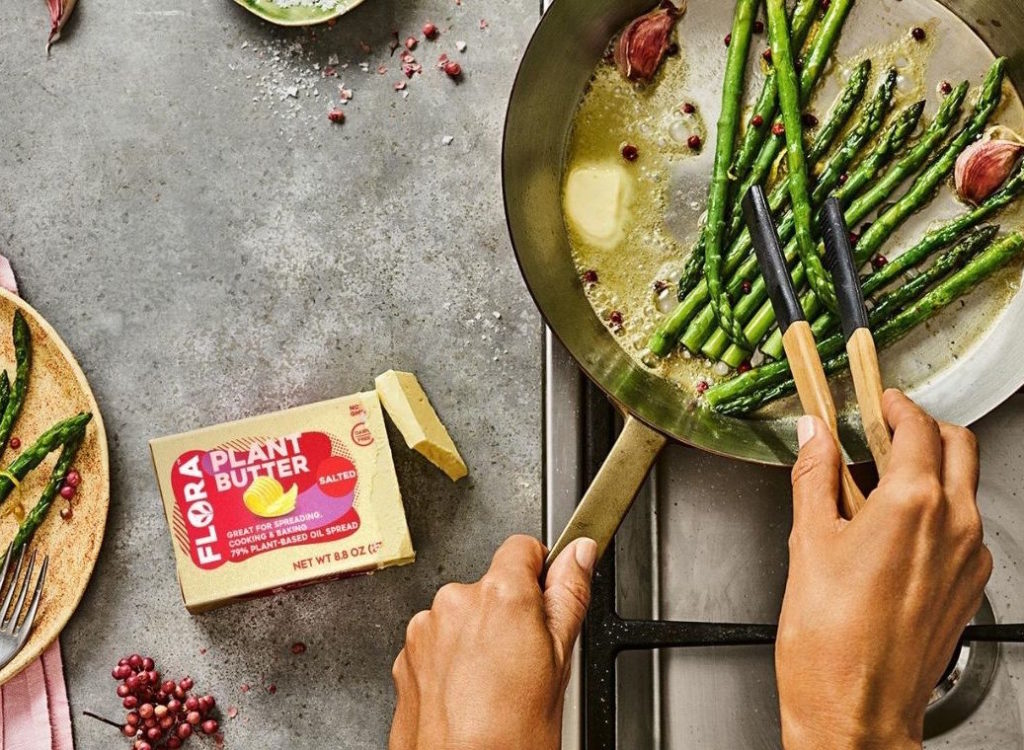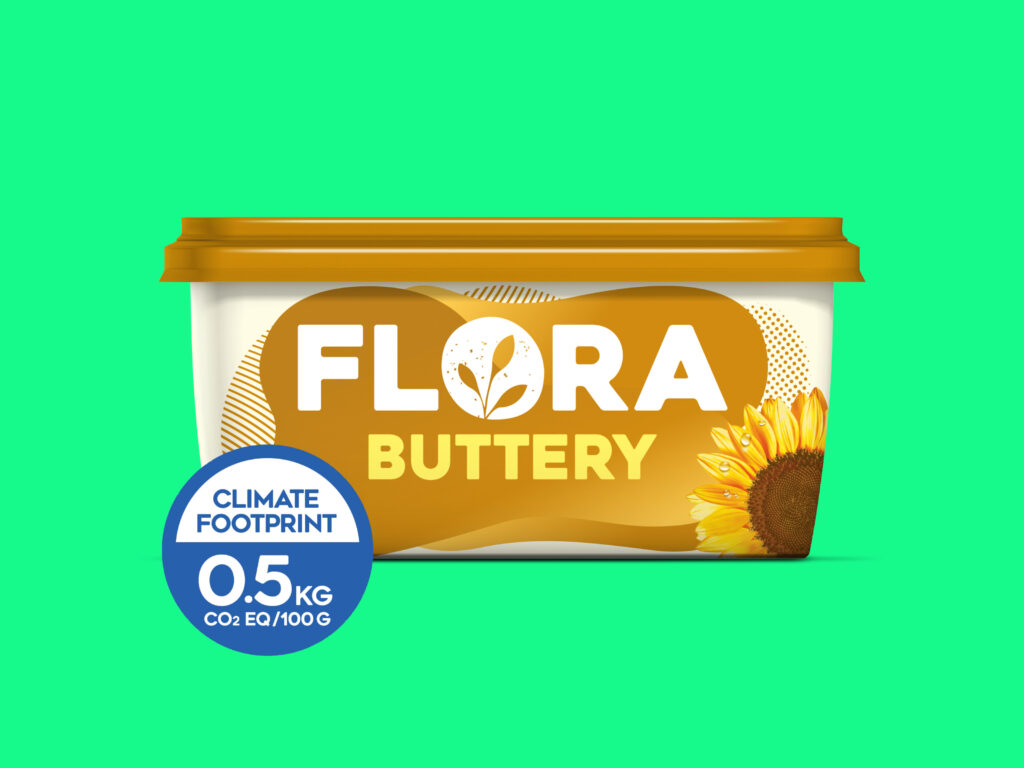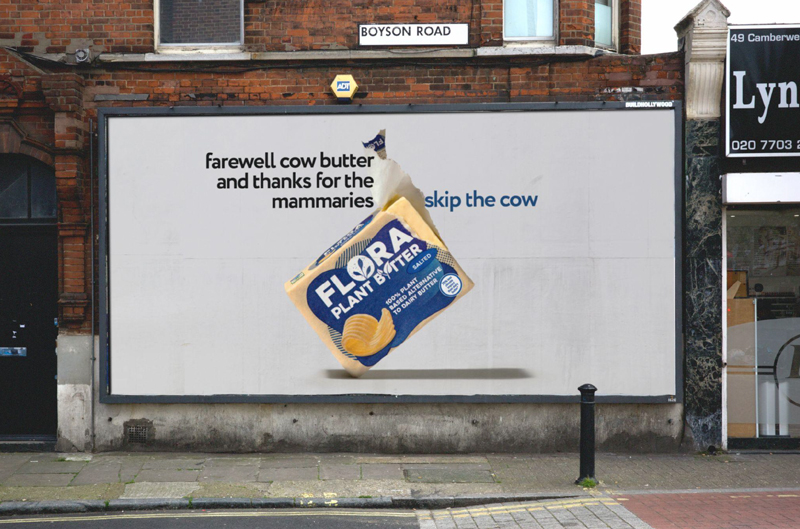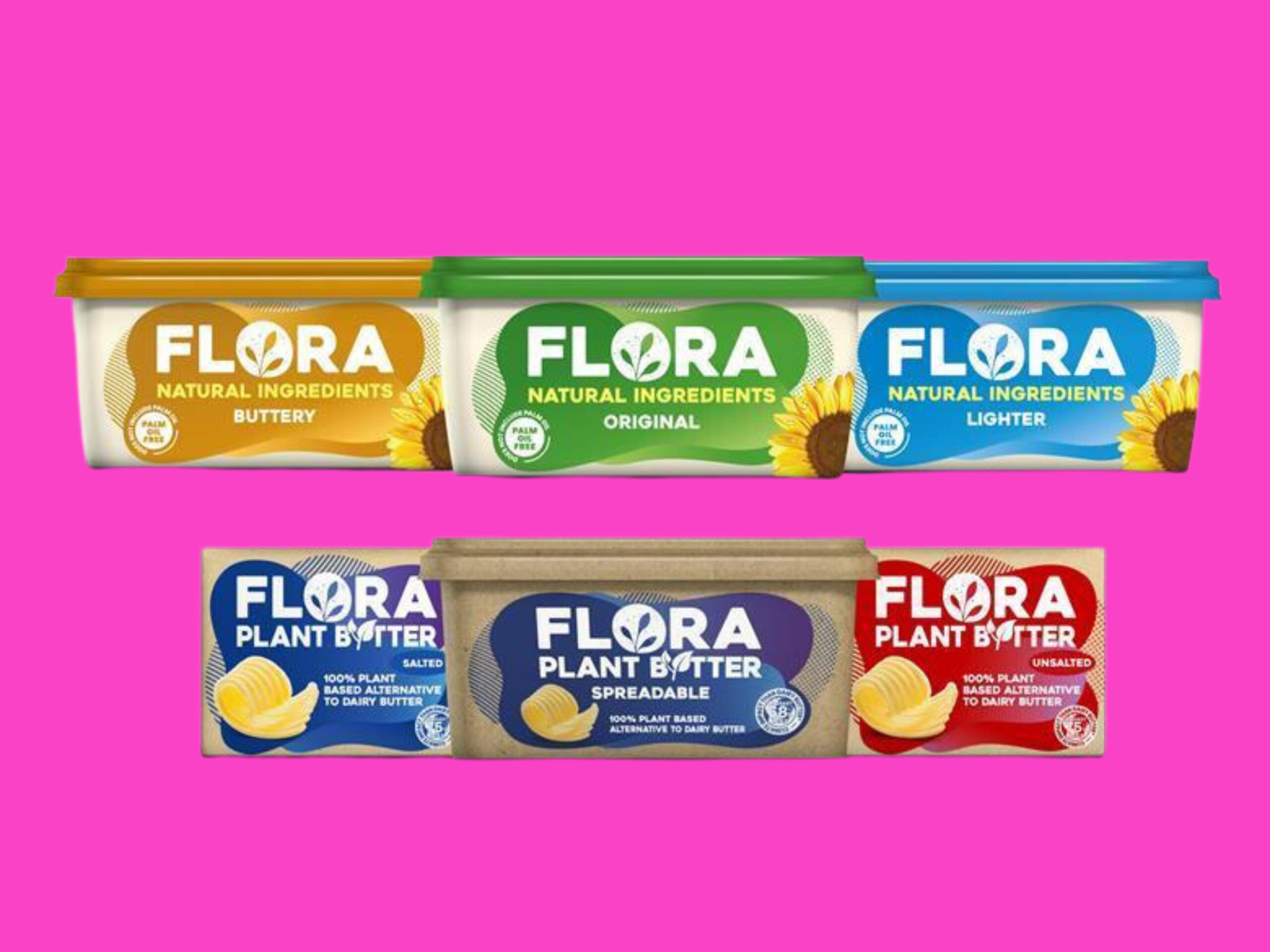5 Mins Read
Last week, CPG spread giant Upfield caused a (positive) stir when it announced its popular Flora Buttery range would go back to being fully vegan in the UK market, three years after the company added buttermilk as an ingredient. The decision has been welcomed by dairy-free consumers and is a step in the right direction for Upfield’s climate efforts. We check in on how the company’s other climate commitments are going.
Flora’s UK range of block and spreads is now 100% vegan, with the brand launching a Skip the Cow campaign to encourage people to think about their dairy consumption. “We have driven record levels of awareness and consideration for Flora and more households are buying and loving the brand as a result. The natural next step was to unite all our great Flora products under a single identity,” said Upfield UK’s marketing director Ian Hepburn.
“We have also been continuously working to deliver a fully 100% plant-based range, that is even tastier and are pleased that Flora Buttery is now deliciously dairy-free. Our purpose is at the heart of everything we do, and we will continue to make new products to continue the Flora movement.”
Upfield is one of the world’s major food CPG companies: the Dutch giant owns multiple brands of margarine, food spreads and plant-based foods – including Flora and Blue Band – and says it is the largest plant-based consumer packaged goods company in the world with operations in over 90 countries.

When asked why Upfield had decided to revert to its 100% vegan butter recipe, the brand didn’t get into the specifics, with a spokesperson telling Green Queen: “There was a decision made some years ago to add a small amount of dairy back into Flora Buttery in the UK. But we have been continuously working to deliver a fully 100% plant-based range that is even tastier – so we are pleased that Flora Buttery is now deliciously dairy-free.”
They confirmed that Upfield has done taste trials with customers for the new recipe for its “plant-based alternative” that “performs just like dairy butter”. “We’ve worked hard to provide the great taste and versatility across cooking, baking and spreading that Flora fans know and love. Customer studies we’ve conducted showed a very positive response to the tastier recipes,” the spokesperson said.
The now-vegan Flora Buttery uses rapeseed, sunflower and linseed oils as a base. Certain seed oils have come under fire from some health experts, they also are known to offer many nutritional benefits. When asked about whether seed oils are healthy, Upfield’s spokesperson stated: “We are proud to offer consumers a healthy source of essential fatty acids within our plant-based products, in line with advice from public health bodies like the WHO and AHA. When compared with dairy butter, our plant-based products are beneficial for heart health, and are suitable for everyone, including those with allergies and intolerances.”
Upfield’s itchy palm
Upfield noted that an ISO-compliant life-cycle assessment (LCA) done using a tool by sustainable consultancy Quantis found the Flora range to have a 68% lower climate impact than conventional dairy butter. It’s a positive step for Upfield’s climate impact, but what about Upfield’s other climate commitments? For example, the company committed to carbon-labelling more and more of its products in 2020, and while the Flora range does not use palm oil – a major driver of deforestation – some of Upfield’s other brands do.
The brand has been in the crosshairs of environmentalists for its palm oil use, with accusations that it worked with BBF, a Brazilian palm oil company that has been accused of violence against Indigenous communities, and Brazilian producer Agropalma, which had its palm oil certification suspended by the Roundtable on Sustainable Palm Oil (RSPO) earlier this year.
Asked to respond to the supply chain violations, the company said in a statement: “Upfield is committed to the sustainable sourcing of palm oil. BBF does not enter our supply chains. We do not source from Agropalma directly, but they appear in our mill list as it is possible they enter our supply chains indirectly. We are investigating the issue, and as part of our policy and process, we will review and engage with our partners as necessary, asking them to take appropriate actions towards Agropalma.”

Upfield reiterated that it’s a “proud member” of the RSPO and has “firm policies” covering the sourcing of not just its palm oil, but soybean oil, pulp and paper, coconut oil and shea too. “This is supported by the Better Planet pillar of Upfield’s ESG strategy. 100% of the palm oil we source is physically certified sustainable palm oil,” the spokesperson said.
“When sourced sustainably, palm oil is a fantastic ingredient. It has a very high yield, meaning that a large amount of palm oil can be produced with low land use.” They added that Upfield has a “strict No Deforestation, No Peat, No Exploitation policy, and hold our suppliers to account for our commitments”.
Sourcing sustainable palm oil remains a complicated affair and while the RSPO is a good place to start, the certifier has attracted criticism of its own, with activists decrying its failure to properly audit companies, slow action on penalising members for breaches, enabling greenwashing, not having high enough standards, and overall inefficacy for smallholders and the planet as a whole. So while having a certified sustainable palm oil product might seem like a good idea, there is often more to the picture than meets the eye.
Carbon labelling and the road to 100% plant-based

As for the carbon labelling of its products, last year, Upfield says that it “over-delivered” on its 2021 labelling target by 20%, with 120 million packs covered with carbon footprint information. It now plans to extend this figure to 500 million by 2025, and the Dutch company’s spokesperson revealed that it had sold 235 million more packs with carbon labels in 2022, after creating a “peer-reviewed and ISO-compliant life-cycle tool that accelerated progress”.
When asked whether it felt counterintuitive to market a Skip the Cow campaign when many of its brands still make and use dairy products, the spokesperson pointed out that the campaign was only for Flora, reiterating that its UK range is now fully dairy-free. Moreover, they alluded to Upfield’s ultimate goal, highlighted as one of its plant-based ESG pillars with the goal to have a billion consumers using its vegan products.
“One of our ESG targets is to transform our portfolio to deliver 100% plant-based products,” they noted. But the timeline for that is unclear.




